[Updated Oct 2020] A guide to serviced offices and office space for rent in Beijing as well as general information that may be useful if you are thinking of renting office space in the city.
For further offices information or to search office space for rent in Beijing just click. Or contact us for any other query.
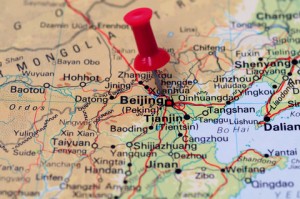
Northern Capital
Beijing is the capital of China and has been a site of huge cultural significance to the entire Chinese nation for centuries. Its name literally translates to mean ‘northern capital’ and it lies towards the north-east corner of the People’s Republic of China. Despite being the capital of the most populous country in the world, Beijing itself is home to fewer people than almost two dozen other metropolises nationwide. Nevertheless, there are still some 22 million people living across the municipality of Beijing.
The name of the city has changed several times over the course of its history, which stretches back as far as three millennia and incorporates an almost unfathomable array of dynastic conflicts and rebellions. Outside forces also had a major say in how Beijing developed during what in Europe was the Medieval period, with the infamous Mongol Genghis Khan successfully invading and burning the city to the ground in 1215. It was subsequently rebuilt however by the ruling Khan in the 1260s and became an increasingly important site in the region under the name Dadu, meaning ‘great capital’.
Ming and Qing
Two of the greatest dynasties ever to have control over northern China were the Ming and Qing respectively. The former lasted close to 300 years from the mid-14th century, after the dominance of the Mongols diminished. Under Ming rule, Beijing was first given its current name and some astonishing construction efforts were undertaken, not least the Forbidden City, which is now a Unesco World Heritage Site and is one of the biggest tourist draws in the centre of the city.
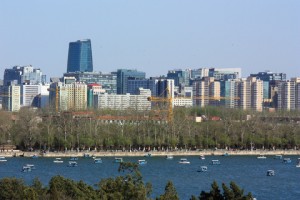
The Ming dynasty officially ended in 1644 after Beijing fell to rebel forces and the Qing dynasty followed soon after and was to rule for another 250 years until 1912. The economy of the region was aided to a large extent by trade with newly arrived European travellers and by a booming population. At various times under the Ming and Qing dynasties, Beijing is reckoned to have been the largest city on earth, including right up until the early 1800s.
Europeans and the Republic
While the Qing dynasty lasted into the 20th century, its strength and influence had been considerably diminished during the prior hundred years or so. Imperialist Europeans, particularly the French and British, were stronger than ever before in regions right across Asia and the Chinese were unable to resist their might, particularly when the westerners teamed-up to fight against them, as happened with the Second Opium War of the 1850s. Anglo-French armies took and briefly occupied Beijing, though they were ultimately satisfied with having a permanent presence and trade access to the city.
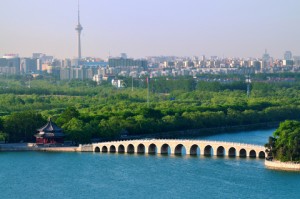
The first half of the 20th century saw the founding of the Republic of China and Beijing dislodged as the capital of the country. Widespread rebellion saw the Qings overthrown, civil war breaks out and the Japanese Empire extended to include parts of northern China and Beijing itself. Mao Zedong and the Communist Party were subsequently able to take the city without resistance in 1949 and establish the People’s Republic of China by way of a speech in Tiananmen Square, flanked by the Forbidden City.
Economy
Few, if any, cities in the world have been so transformed in recent decades as has Beijing. The administrative and cultural capital of China, it has been at the forefront of much of the country’s development and economic growth, particularly since the beginning of the 21st century. China’s growth has occurred at a quite blistering pace and it has gone from being an important but emerging economy to one that is among the pre-eminent powerhouses on the global stage.
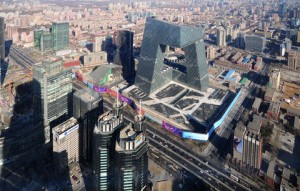
For its part, Beijing is home to dozens of increasingly large-scale financial organisations. Shanghai is generally regarded as being the primary driving force being the Chinese economy but the capital has an extremely strong services sector, as well as some of the country’s largest media, pharmaceuticals and electronics companies. Venture capital style start-up investment and entrepreneurial endeavour is also a feature of what has given Beijing such dynamic and seemingly unstoppable economic growth.
Office space for rent in Beijing
The rapid rise of Beijing as a centre of the world economy and the development of vast swathes of office space to rent have gone largely hand-in-hand. Businesses need office space in order to operate and sites have been steadily found across the city as ever-more economic activity took place. In order to maintain some level of coherence, building work in Beijing has been structured within the framework of various industrial parks, with office space residents focussing on particular commercial sectors.
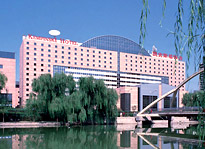
There is a central business district covering around four square kilometres in the east of the city where much of Beijing’s most sought after office space is available and where many of the largest financial and media businesses are based. The strength of the Chinese economy at present is drawing overseas companies to the country in greater numbers than ever before, while also helping local firms build their profiles. All of which means the supply of office space to rent is struggling to match demand and driving rental costs upward, though not currently at rates fast enough to cause alarm, according to Cushman & Wakefield at least.
Transport
Given its history as one of China’s leading cities and its importance within the context of Asia as a whole, it is perhaps unsurprising that Beijing is among the biggest transport hubs in the world. An extensive railway system links the city with all the other major cities within striking distance and is of great importance to how Beijing functions on a day-to-day basis. Trains also run beyond China into Korea, Vietnam, Russia and Mongolia.
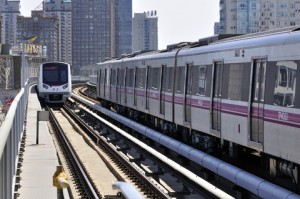
Beijing’s road system is centred around the Forbidden City and extends out via increasingly large ring-like highways that are being used by more and more vehicles every month. Congestion is a major problem across the city and one that is being addressed by the local authorities through projects like the expansion of the Beijing subway. To the north-east of the city lies its main air transit hub in the shape of the Beijing Capital International Airport, which has three terminals and is the busiest in Asia.
Culture and sport
The rapid pace of change in and around Beijing has seen aspects of the city’s ancient culture disappear as the trademark alleyways and buildings are obliged to make way for more modern constructions. Nevertheless, there is still an array of cultural diversity that is celebrated in various ways at different times of the year, and there are some really breathtaking heritage sites that are unique to the city and very much worth a visit.
Popular sports in Beijing include football, basketball, baseball and ice hockey, but easily the most significant sporting event in the city’s history was its hosting of the Summer Olympic Games in 2008. Along with the Paralympics, it was one of the grandest sporting spectacles ever staged and saw thousands of the world’s top athletes competing in China for the very first time.
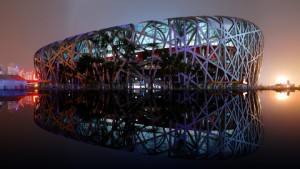
Our office space search, advisory and acquisition services are FREE, always. Our Beijing office space brokers and agents are globally regulated by the Royal Institution of Chartered Surveyors (RICS) ensuring the highest standards of commercial property advice and service at all times.
